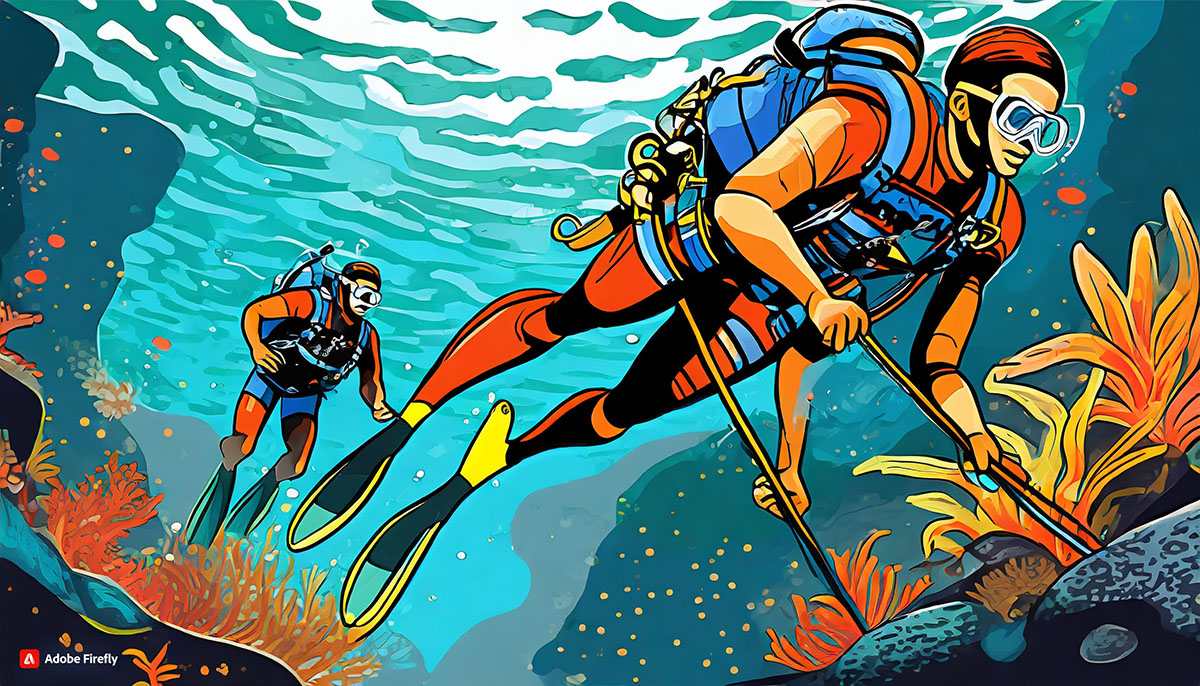The ocean, a vast and mesmerizing expanse, beckons divers with promises of vibrant coral gardens, playful marine creatures, and sunken treasures. But how deep can divers delve into this underwater kingdom? The answer, like the ocean itself, holds layers of complexity, depending on the type of diver and their ambitions.
How deep can open water divers go?
For most scuba enthusiasts, the journey begins with open water diving. Imagine sunlight dappling through turquoise waters as you glide over coral reefs teeming with life. Clownfish peek from anemones, vibrant butterflyfish flit by, and schools of silver fish ripple like liquid light. This mesmerizing realm, typically between 12 and 18 meters (40-60 feet) deep, offers a safe and awe-inspiring introduction to the underwater world.
How deep can technical divers go?
But the ocean whispers of deeper secrets. For experienced divers, the call of technical diving echoes. Here, specialized equipment, advanced training, and meticulous planning unlock depths from 40 to 100 meters (130-330 feet). Imagine entering a cathedral of kelp forests, sunlight fading as you explore shipwrecks encrusted with barnacles, or navigating underwater caves adorned with delicate coral formations. Technical diving demands respect, careful planning, and a deep understanding of decompression and gas management. But for those who answer its call, the rewards are unparalleled.
How deep can navy divers go?
Navy divers, also known as military divers, operate in a realm beyond most civilian divers. Their focus lies on national security, with missions like search and rescue, underwater construction, and reconnaissance demanding skills like equipment repair, combat diving, and underwater demolition. Their depth range is often classified, but their training pushes human limits, allowing them to operate in extreme depths reserved for technical divers.
Scuba Diving: A Portal for All
This article wouldn’t be complete without mentioning the foundational pillar of underwater exploration: scuba diving. Whether you’re a beginner marveling at the first clownfish or a seasoned adventurer exploring coral walls, scuba diving allows us to breathe underwater and experience the ocean’s magic firsthand. Remember, safety is paramount. Choose dives within your certification limits, prioritize meticulous buddy checks, and respect the ocean’s power.
Let’s Dive Deeper: A Final Thought
The depths of the ocean hold immense wonder and intrigue, but with them come responsibility and respect. Regardless of your diving level, remember:
- Know your limits: Choose dives within your training and experience.
- Plan and equip yourself properly: Research the dive site, ensure your gear is functioning, and choose the right gas mixtures for deeper dives.
- Buddy up and stay together: Communication and teamwork are crucial underwater.
- Listen to your body: Ascend if you feel unwell or experience any signs of decompression sickness.
- Respect the ocean: Minimize your impact, observe marine life without disturbing them, and never remove anything from the underwater environment.
The ocean awaits, with depths to suit every diver’s skill and ambition. Dive responsibly, dive safely, and let the underwater world reveal its breathtaking secrets to you.
FAQs:
Q: What factors determine how deep a diver can go?
A: The depth a diver can safely reach depends on their training, experience, equipment, breathing gas used, and physical fitness.
Q: Is it dangerous to dive deeper than the recommended depth for your certification?
A: Yes, exceeding safe diving limits significantly increases the risk of decompression sickness, nitrogen narcosis, and other diving-related injuries.
Q: What are the differences between recreational, technical, and navy diving?
A: Recreational diving focuses on exploration and enjoyment within safe limits. Technical diving involves advanced training and equipment to explore deeper, more challenging environments. Navy diving emphasizes military-specific skills and operations, often at extreme depths.
Q: Are there any legal restrictions on diving depth?
A: Recreational diving agencies typically set depth limits for their certifications. Most countries have no legal restrictions on recreational diving depth, but technical diving often requires permits due to its complexity and potential risks.
Reference:
- Professional Association of Diving Instructors (PADI): https://www.padi.com/
- Technical Diving International (TDI): https://www.tdisdi.com/tdi/
- United States Navy Diving and Salvage Manual: https://www.navsea.navy.mil/Portals/103/Documents/SUPSALV/Diving/US%20DIVING%20MANUAL_REV7.pdf?ver=2017-01-11-102354-393
